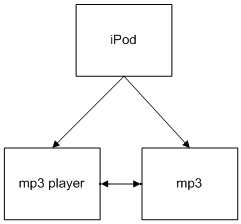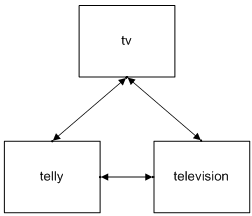
Synonyms are added to the thesaurus using the Site Manager. Before you begin adding synonyms, you should:
Have a valid Site Manager log in and know how to access the Site Manager;
Know how to navigate the Site Manager and find various sections in it;
Be logged in to the Site Manager;
Know which synonyms you want to add and which terms to associate them with;
Know the relationships between the synonyms and the terms.
The Site Manager defines two different relationships that can be used with synonyms: one-way and two‑way:
In a one-way relationship one primary term is established as a synonym for a collection of words. For example, assume you want to set up a relationship among the words "ipod", "mp3 player", and "mp3" where if "mp3 player" or "mp3" is searched for, you'd also like to have matches for "ipod" returned with the search results. But if "ipod" is searched for, you do not want matches for "mp3 player" or "mp3" returned. (The assumption here is that the customer who searches for "ipod" wants a specific kind of digital music player, whereas "mp3" and "mp3 player" will return broader results.) This means that "ipod" is a synonym for both "mp3" and "mp3 player", but "mp3" and "mp3 player" are not synonyms for "ipod". This scenario describes a one-way relationship where "ipod" is the primary term. In a one‑way relationship, the primary term is a synonym for the other terms, but other terms are not synonyms for the primary term.

A two-way relationship is a relationship where there is no primary term and all the terms are synonyms for each other. An example of this would be "tv" , "television" and "telly" where no matter which term was searched on, you want to return search results that contained matches for all the terms.

Synonyms sometimes have one-way relationships with some terms and two-way relationships with other terms. See Multi-relationship Example for an example of this.